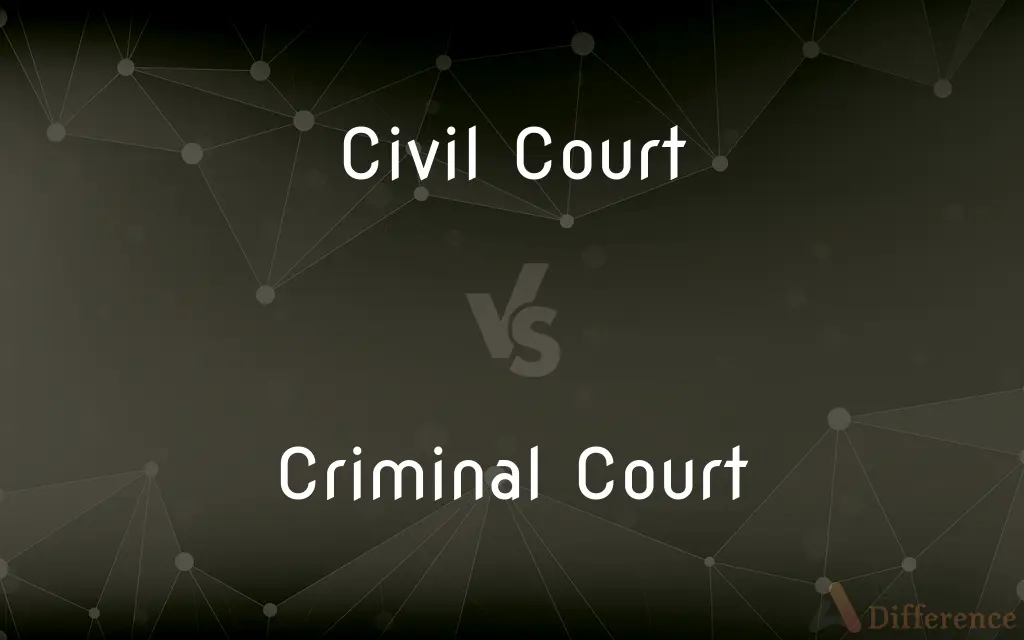Civil Court vs. Criminal Court — What's the Difference?
By Fiza Rafique & Urooj Arif — Published on September 23, 2024
Civil courts handle disputes between individuals or entities over rights and obligations, while criminal courts deal with cases where laws are broken, focusing on punishing offenders.

Difference Between Civil Court and Criminal Court
Table of Contents
ADVERTISEMENT
Key Differences
Civil courts primarily address conflicts between individuals, organizations, or a combination thereof, involving matters such as contracts, property disputes, and family law. The aim is to resolve disputes and, if necessary, provide compensation to the aggrieved party. On the other hand, criminal courts are concerned with offenses against the state or society at large. Here, the focus is on determining guilt and imposing penalties such as fines, community service, or imprisonment.
In civil court cases, the burden of proof is "preponderance of the evidence," meaning it's more about the balance of probabilities. Criminal courts, however, operate under "beyond a reasonable doubt," a higher standard due to the potential consequences like imprisonment or even death.
The parties involved in civil courts are typically referred to as the plaintiff (who brings the suit) and the defendant (who defends against the claim). In criminal courts, the government (state or federal) acts as the plaintiff, known as the prosecution, while the accused is the defendant.
Outcomes in civil court often involve monetary compensation or orders to do or not do something (injunctions). Criminal court outcomes can include incarceration, fines, probation, or community service, aimed at punishing and rehabilitating the offender and deterring future crimes.
Civil court cases can be initiated by any individual or entity claiming harm. Criminal cases are commenced by the government following an investigation into an alleged crime, emphasizing the state's role in maintaining law and order.
ADVERTISEMENT
Comparison Chart
Purpose
Resolve disputes, provide compensation or injunctions.
Punish offenses against society, ensure public safety.
Standard of Proof
Preponderance of the evidence.
Beyond a reasonable doubt.
Parties Involved
Plaintiff vs. Defendant.
Prosecution (Government) vs. Defendant.
Possible Outcomes
Monetary compensation, injunctions.
Incarceration, fines, probation, community service.
Case Initiation
By individuals/entities claiming harm.
By government following an investigation.
Compare with Definitions
Civil Court
They handle personal injury claims.
C seeks damages from D for injuries in a car accident.
Criminal Court
They handle assault cases.
L is prosecuted for assaulting M.
Civil Court
They oversee family law matters.
E files for divorce from F.
Criminal Court
They oversee drug-related offenses.
N is charged with possession of illegal substances.
Civil Court
Civil courts adjudicate disputes over contracts.
A sues B over a breach of contract.
Criminal Court
They deal with fraud cases.
O is tried for committing financial fraud.
Civil Court
They resolve property disputes.
G disputes H over land ownership.
Criminal Court
Criminal courts prosecute theft cases.
The state charges K with burglary.
Civil Court
They adjudicate employment law cases.
I claims wrongful termination by J.
Criminal Court
They adjudicate murder cases.
P is charged with the murder of Q.
Common Curiosities
Who can initiate a civil case?
Any individual or entity claiming to have suffered harm.
What differentiates civil court from criminal court?
Civil courts resolve private disputes, while criminal courts deal with offenses against society.
Who initiates criminal cases?
The government, following an investigation of alleged crimes.
What are typical outcomes in criminal court?
Incarceration, fines, probation, or community service.
What is the standard of proof in civil court?
The preponderance of the evidence.
What is the standard of proof in criminal court?
Beyond a reasonable doubt.
What are typical outcomes in civil court?
Monetary compensation or injunctions.
Can you appeal a civil court decision?
Yes, parties can appeal the court's decision.
Can a case be both civil and criminal?
Yes, some actions can lead to both civil litigation and criminal prosecution.
What does the plaintiff represent in civil court?
The party bringing the lawsuit.
Can you appeal a criminal court decision?
Yes, defendants can appeal convictions or sentences.
Are juries used in both civil and criminal courts?
Yes, but their presence varies by jurisdiction and case type.
Can civil cases be settled out of court?
Yes, many civil disputes are resolved through settlement.
Is representation by an attorney required in these courts?
While not always legally required, it's strongly recommended in both civil and criminal cases.
What does the prosecution represent in criminal court?
The government charging the defendant with a crime.
Share Your Discovery

Previous Comparison
Packaged Software vs. Custom Software
Next Comparison
Lysogenic Phase vs. Lytic PhaseAuthor Spotlight
Written by
Fiza RafiqueFiza Rafique is a skilled content writer at AskDifference.com, where she meticulously refines and enhances written pieces. Drawing from her vast editorial expertise, Fiza ensures clarity, accuracy, and precision in every article. Passionate about language, she continually seeks to elevate the quality of content for readers worldwide.
Co-written by
Urooj ArifUrooj is a skilled content writer at Ask Difference, known for her exceptional ability to simplify complex topics into engaging and informative content. With a passion for research and a flair for clear, concise writing, she consistently delivers articles that resonate with our diverse audience.













































